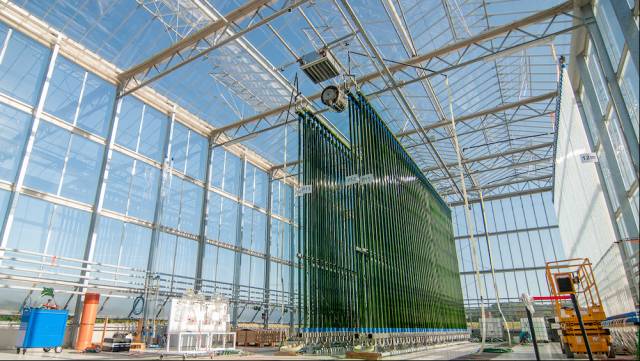International technology group Schott and ecoduna, an Austria-based commercial technology and algae producer, have teamed up to maximize algae production efficiency while cutting expenses by using glass tubing.
ecoduna produces and harvests different algae as chlorella or spirulina, a blue-green algae used for dietary supplements and animal feeds, in vertical photobioreactors and previously changed the production technology from plastic panels to SCHOTT 65mm glass tubes. Glass tubes require less cleaning and downtime while generating the same biomass output. After switching to glass tubing at its Austrian plant in June, ecoduna’s photobioreactors ran continuously for months, which simultaneously increases output while driving down operating costs.
Algae manufacturers are increasingly replacing plastic for glass components in their photobioreactors, favoring glass’ cleanabilty, strength and clarity – important parameters that affect output and cost for large scale algae production. Also the material’s longevity is one of its key advantages: ecoduna says it used to plan to replace plastic plates every 10 years, but the 50-year lifespan of glass tubing makes a full system replacement far less common.
ecoduna’s world-patented vertical photobioreactors, which eliminate pumps and where CO2 and nutrients are introduced continuously at the bottom, are highly efficient and guarantee maximum purity, However, on the walls of the plastic panels biofilms accumulate that require frequent cleaning, leading to regular shutting down of the production systems. Because Schott’s high quality, round DURAN® glass tubing has a smooth inner surface, biofilm formation is strongly reduced and they are on the brink of self-cleaning, which extends production to a near-continuous process. The cleanliness of the glass allows the system to run on an continuous industrial scale, making cultivation possible 365 days of the year.
“Bacteria are algae’s enemies, and the scratches that are common on the inside of plastic tubing after many cleaning cycles make the perfect breeding ground for those enemies. The robustness of Schott’s glass tubing makes the photobioreactor strong without the risks of contamination,” said Johann Mörwald, CEO at ecoduna. “Using glass tubing has proven to be a smart investment that pares operating expenses and practically eliminates replacement costs.”
ecoduna plans to use glass tubing at their new production facility in Austria, and in a facility that it runs with a partner in Denmark.
“As commercial algae producers work to improve biomass yields and harvests, it’s clear that the hardware in photobioreactors plays a critical role in algae growth,” said Dr. Niko Schultz, PBR Designer at Schott Research and Development. “Glass tubing has proven effective in both horizontal and vertical photobioreactors, and its robustness and cleanliness extend the lifespan of these systems by multiple factors. Our work with ecoduna will continue as together we find ways to improve system efficiencies, boost algae growth, and increase biomass yields.”
For more information: www.us.schott.com/pbr




